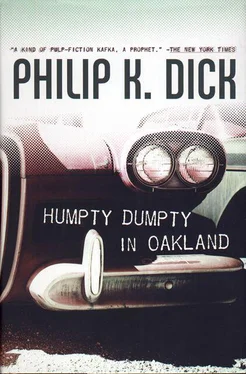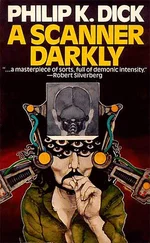“It would be up to you. There’s no reason why it wouldn’t work out. They have a mint tied up in this place and it’s all geared in with the freeway. They know approximately when they should have most of the houses sold. You’d start getting a return on your investment right from the start anyhow, because there’re a lot of other tracts around here, a lot of them filled, and people coming down from Petaluma. And on weekends this is busy with traffic going up to the Russian River. You saw the number of cars on 101. This is a busy area, and getting more busy all the time. What else can it do but grow?”
Jim Fergesson climbed with effort. Ahead of him Carmichael talked on and he listened as best he could. His hands were wet and they stung from the edges of the grass. At one point he stumbled and fell against the dirt; his fingers dug and floundered and he shut his eyes. Carmichael was at the top and going on, slowing because he saw that the old man was not keeping up with him. Fergesson stood up and stepped widely, to finish in three last strides. At the top was a collection of steel support bars and as he reached them his toe caught in the dragging weeds that had grown across them. He stepped forward and his body collapsed. The air rushed out of him and he fell into darkness, fell so suddenly that he could say nothing. It was as if the ground had magnetized him. He went over on his face like metal, with his arms out; he did not feel the ground come up and he did not hear himself fall. One moment he was laboriously climbing behind Carmichael and then he lay face down in the ooze.
Carmichael, still talking, walked a few paces. He said, “Oh hell,” and came back, bending, with his placid horse-face dipping toward Fergesson. The old man felt his presence and grunted, wanting to lift himself. But he couldn’t. He had no strength. A distant humming was all he could hear and although he could remember Carmichael’s voice, he could not really catch the sound of it.
Taking hold of the old mans arm Carmichael tried to lift him. He lifted with both hands but Fergesson did not budge; Carmichael could not budge him and Fergesson felt his own weight, heavy and dead, snapped tight by the magnetic ground. He had been snared and he could do and say nothing; he could only wait. He hoped that Carmichael would have an answer.
“Hey,” Carmichael said to some workmen along the hillside. “Give me a hand.”
The workmen walked over. Fergesson did not feel foolish or frightened; he felt a little sick at his stomach and now his chest was beginning to hurt. He could, with his mind, trace the outline of the steel support bars. They were under him. The pressure became pain and he winced.
“What happened?” a workman said.
“He fell,” Carmichael said. They lifted the old man to his feet; they tipped him back to a standing position. Fergesson found himself upright, dripping mud and crushed weeds. The pressure remained on his chest, however; he lifted his hand and brushed reflexively. His face seemed puffy and leaking, as if it were drizzling blood.
“Thanks,” Carmichael said; the workmen went off. “Hey,” he said to Fergesson. “You really took a spill.”
Fergesson nodded. The pain in his chest numbed him. He touched himself with his stiff fingers but he felt nothing at all. He could not talk, either. Now he was frightened.
“Let’s go into the office,” Carmichael said. With his hand on Fergesson’s shoulder he walked him toward the tar-paper-roofed shack. “How about a cup of coffee?”
“No,” Fergesson said. His voice sounded a long way from him and discordant. As if he were hearing it through a wire. “I have to get back.”
“You want to get into your car?”
Fergesson nodded, and Carmichael walked with him to the parked Pontiac. Carmichael opened the door and the old man got in behind the wheel. He leaned back against the upholstery and sucked in huge gusts of air. The air hurt his throat, as if it too were skinned by the fall. He held his hand against his chest and pushed in.
“How do you feel?” Carmichael said.
He nodded.
“You have to watch that wet dirt; it’s tricky.”
“Yes,” Fergesson said. His head was beginning to clear and he could see. But he felt so sick that he knew he had broken something inside; he was trembling and scared and he wished Carmichael would leave. He wanted to go back to Oakland.
Carmichael, leaning by the car door, was talking at great length, continuing his discussion as if nothing had happened. His infinite calm had not been broken; the old man had fallen and Carmichael had arranged to get him back on his feet. The old man perspired as he lay against the upholstery of his car, and he thought about driving back. He was sure he could do it; he could, if necessary, pull off the road. He wanted to leave right now and he opened his eyes and interrupted: “Thanks, Mr. Carmichael. I’ll see you.” With his right hand he put on the ignition and with his foot he pushed down on the gas. The motor started.
“Wait,” Carmichael said. “I’ll give you my card.”
Fergesson accepted the card and put it in his pocket. He let the car go forward a yard and Carmichael walked along beside it. Staring through the windshield Fergesson blinked as sweat got into his eyebrows and down into his eyes. The pain was more intense, less dull; he felt it locate itself in his heart and suddenly he understood that he had had a heart attack; not much of one, a small one, from the climbing and the excitement.
“Goodbye,” he said. Nodding with the motion of the car he drove down the road.
“I’ll see you, Jim,” Carmichael said. He was lost to Fergesson’s sight. The sound of his voice dwindled. Fergesson drove with both hands clutching the wheel. When he had gone a mile or so he slowed and lay back again, trying to make himself comfortable. The pain seemed to be fading. He was glad of that.
By the time he had found his way back onto the highway he was able to sit up entirely. The cramp, or pain, was fading. Trembling, he shifted for the first time into high gear. The roar of the engine subsided.
He was still frightened and as he drove he sang to himself, “Bom, bom. Bom, bom.” It meant nothing and he had never made sounds like that before; with his lips he repeated the sounds again and again, as if they were important. “Bom, bom.” He was relieved to see San Rafael on both sides of the highway, because that meant he would soon be on the bridge and going back across to the East Bay. “Bom, bom,” he said to himself, hearing his own voice. He gained strength and said it louder. The midday sun was hot and it made perspiration steam down his cheeks and into his collar. His coat stuck against him and when he moved he felt the sticky plucking of fabric. Perhaps, he thought, his chest had been laid open by the steel beams.
The garage had not been opened for the day; its wooden doors were shut. The old man parked his Pontiac in the entrance and got clumsily out to unlock the padlock that held the doors together. As he dragged them up a rush of dank, dismal air billowed past him.
When he had brought the Pontiac inside he went into his office and unfastened his coat. He dug down to his flesh, under his shirt and undershirt, and found the cloth soggy with blood. A deep indentation crossed his ribs. It was still bleeding. Presently he went to the washroom, and, with the bar of Lava soap, sponged away the blood. The indentation was white and the flesh was not as much cut as dented away.
So, he thought, back at his desk in the office, the pain had come from the impact, from the blow; steel had hit him across the chest and there was no reason to suppose anything more serious. The pain was gone. He felt weak and sick. Leaning, he opened the bottom desk drawer and groped for the half-pint of Christian Brothers Brandy. A paper dixie-cup, filled with paper clips, was the only glass he could find. After he had drunk some of the brandy he sat pushing the clips across the desk surface. Then at last he looked up Harman’s telephone number and dialed.
Читать дальше










